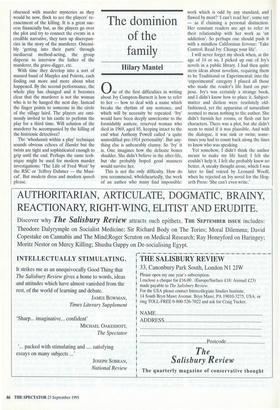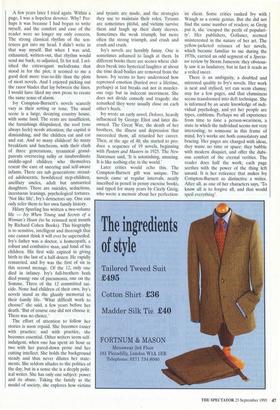The dominion of the family
Hilary Mantel
One of the first difficulties in writing about Ivy Compton-Burnett is how to refer to her — how to deal with a name which breaks the rhythm of any sentence, and which will by necessity be repeated. 'Ivy' would have been deeply unwelcome to the formidably austere, reserved woman who died in 1969, aged 85, keeping intact to the end what Anthony Powell called 'a quite unmodified pre-1914 personality'. But any- thing else is unbearably clumsy. So 'Ivy' it is. One imagines how the delicate bones shudder. She didn't believe in the after-life, but she probably hoped good manners would survive her.
This is not the only difficulty. How do you recommend, wholeheartedly, the work of an author who many find impossible: work which is odd by any standard, and flawed by most? 'I can't read her', some say — as if claiming a personal distinction. Her constant readers are apt to refer to their relationship with her work as 'an addiction'. So perhaps one should push it with a mindless Californian fervour: 'Take Control: Read Ivy: Change your life'.
I will never forget my shock when, at the age of 14 or so, I picked up one of Ivy's novels in a public library. I had then quite stern ideas about novelists, requiring them to be Traditional or Experimental; into the `experimental' category I placed all those who made the reader's life hard on pur- pose. Ivy's was certainly a strange book, and I didn't know how to place it. Subject- matter and diction were resolutely old- fashioned, yet the apparatus of naturalism seemed to mean nothing to the author. She didn't furnish her rooms, or flesh out her characters. There was a plot, but she didn't seem to mind if it was plausible. And with the dialogue, it was sink or swim; some- times you had to count back along the lines to know who was speaking.
Yet somehow, I didn't think the author meant to make my life hard; I felt she couldn't help it. I felt she probably knew no better. A sneaky thought arose, which I was later to find voiced by Leonard Woolf, when he rejected an Ivy novel for the Hog- arth Press: 'She can't even write.' A few years later I tried again. Within a page, I was a hopeless devotee. Why? Per- haps it was because I had begun to write myself, and the comfort and ease of the reader were no longer my only concern. The strong classical, rhythm of the sen- tences got into my head. I didn't write in that way myself. But when I was arid, exhausted, written-out, that rhythm would send me back, re-adjusted, fit for toil. I rel- ished the extravagant melodrama that stood in for the plot; it seemed to me a good deal more true-to-life than the plots of most novels. And I enjoyed picking out the razor blades that lay between the lines. I would have liked my own prose to create the same sense of alarm.
Ivy Compton-Burnett's novels scarcely vary in their setting or tone. The usual scene is a large, decaying country house, with some land. The rents are insufficient, the furnishings dilapidated, the roof (one always feels) needs attention; the capital is diminishing, and the children eat and eat and eat. And so many children! So many breakfasts and luncheons, with their clash of three generations, tyrannical grand- parents overseeing sulky or insubordinate middle-aged children who themselves resent the care of sneering and self-aware infants. There are sub generations: strand- ed adolescents, bewildered step-children, ancillary uncles, adult but unmarried daughters. There are suicides, seductions, incestuous leanings, psychological tortures. `Not like life', Ivy's detractors say. One can only refer them to her own family history.
Hilary Spurling has written a two-volume life — Ivy When Young and Secrets of a Woman's Heart (to be reissued next month by Richard Cohen Books). This biography is so sensitive, intelligent and thorough that one cannot think it will ever be superseded. Ivy's father was a doctor, a homeopath, a robust and combative man, and fond of his children. His first wife expired in giving birth to the last of a half-dozen. He rapidly remarried, and Ivy was the first of six in this second menage. Of the 12, only one died in infancy. Ivy's full-brothers both died young: one of pneumonia, one on the Somme. Three of the 12 committed sui- cide. None had children of their own. Ivy's novels stand as the ghastly memorial to their family life. 'What difficult work to choose!' she said, a few years before her death. 'But of course one did not choose it. There was no choice.'
The effort of attention to follow her stories is soon repaid. She becomes easier with practice; and with practice, she becomes essential. Other writers seem sell - indulgent, when one has spent an hour or two with her pared-down prose and her cutting intellect. She holds the background steady and thus never dilutes her state- ments. She seldom alludes to the politics of the day, but in a sense she is a deeply polit- ical writer. She has only one subject: power and its abuse. Taking the family as the model of society, she explores how victims and tyrants are made, and the strategies they use to maintain their roles. Tyrants are sometimes pitiful, and victims survive them and laugh up their dusty sleeves. Sometimes the weak triumph, but more often the strong triumph, and crush and crush and crush.
Ivy's novels are horribly funny. One is sometimes ashamed to laugh at them. In different books there are scenes where chil- dren break into hysterical laughter at about the time dead bodies are removed from the house. Ivy seems to have understood how repressed emotion (buried over a lifetime, perhaps) at last breaks out not in murder- ous rage but in indecent merriment. She does not divide comedy and tragedy; she remarked they were usually close on each other's heels.
Ivy wrote an early novel, Dolores, heavily influenced by George Eliot and later dis- owned. The Great War, the death of her brothers, the illness and depression that succeeded them, all retarded her career. Then, at the age of 40, she started to pro- duce a sequence of 19 novels, beginning with Pastors and Masters in 1925. The New Statesman said, 'It is astonishing, amazing. It is like nothing else in the world.'
Later critics would echo this. The Compton-Burnett gift was unique. The novels came at regular intervals, neatly inscribed in pencil in penny exercise books, and typed for many years by Cicely Greig, who wrote a memoir about her perfection- ist client. Some critics ranked Ivy with Waugh as a comic genius. But she did not find the same number of readers; as Greig put it, she 'escaped the perils of populari- ty'. Her publishers, Gollancz, seemed uninterested in the nature of her art. The yellow-jacketed reissues of her novels, which became familiar to me during the 1970s, carried an odd segment of a Specta- tor review by Storm Jameson: they obvious- ly saw it as laudatory, but in fact it reads as a veiled sneer.
There is an ambiguity, a doubled and mirrored quality to Ivy's novels. Her work is neat and stylised, yet can seem clumsy; stay for a few pages, and that clumsiness seems transformed into deft technique. She is informed by an acute knowledge of indi- vidual psychology, and yet her people are types, emblems. Perhaps we all experience from time to time a person-weariness, a state in which the individual seems not very interesting; to someone in this frame of mind, Ivy's works are both consolatory and bracing. Her pages are charged with ideas, they waste no time or space; they bubble with modern disquiet, and offer the dubi- ous comfort of the eternal verities. The reader does half the work; each page seethes with the power of the thing left unsaid. It is her reticence that makes Ivy Compton-Burnett so distinctive a writer. After all, as one of her characters says, 'To know all is to forgive all, and that would spoil everything'.



































































 Previous page
Previous page